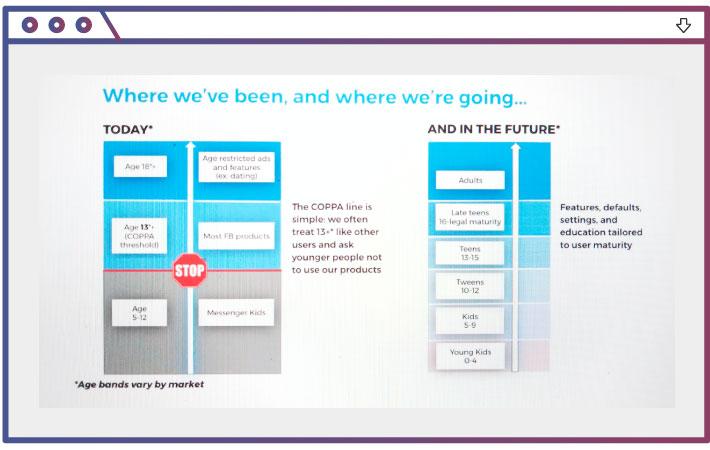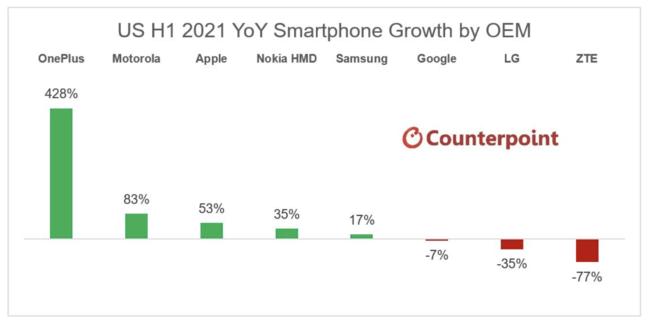The Wall Street Journal Japanese Edition In addition to children's version of Instagram, FB is targeting the younger age group
In the past few days, Facebook has become even more critical of its impact on young users and its efforts to create a platform for children. Over the years, the company had various plans to attract more children under the age of 13 than the public knew. What drove it was the sense of crisis that Facebook might lose a new generation of users who would determine its future.
According to Facebook's internal documents confirmed by The Wall Street Journal (WSJ), the company formed a research team targeting people under the age of 13 and set a three-year goal to increase the number of products aimed at them. and put together a strategic plan for the long-term business opportunities presented by those potential users.
An internal document from 2020 reads, "Why do we pay attention to tweens (ages 10-12)?" “They are a valuable but untouched audience.”
Source: From Facebook's internal presentation material "Tweens Competitive Audit" in February 2020
Facebook is not the only technology company that has been criticized for soliciting children. Virtually all major social media platforms, including TikTok, operated by China's ByteDance, and video-sharing site YouTube, have legal and regulatory implications for children's use. I am facing above problem. Federal Privacy Act bans data collection from children under 13, and lawmakers have criticized tech companies for doing more to protect children online from criminals and harmful content. there is
From Facebook's internal documents, it can be seen that competition with competing apps (especially "Snapchat" and "TikTok" operated by Snap) motivated these efforts.
The company's attitude towards young users is expected to be taken up at the hearing of the Senate subcommittee on the 30th. The hearing will examine the impact of Facebook's photo-sharing app Instagram on mental health. The WSJ reported earlier this month that an internal Facebook investigation found Instagram was harmful to the mental health of teens, especially girls, but lawmakers cited the article in their call for a public hearing. .
On the 27th, Mr. Adam Mosseri, head of Instagram, announced that the development of Instagram for children, often referred to as "Instagram Kids", would be temporarily suspended. Mosseri said Facebook needs time to explain to parents, experts and lawmakers before proceeding with development. He also argued that without a version for children under the age of 13, underage users would simply misrepresent their age and use Instagram.
Both Senators Richard Blumenthal (Democrat, Connecticut) and Marsha Blackburn (Republican, Tennessee) discussed what kind of research Facebook did to promote and sell its products to children. He said he wanted to clarify whether
"Big Bet"
Internal documents from this year show that over the past five years, Facebook has been making a "big bet" to create products that appeal to children under the age of 13 across its services.
from the files
from the files
from the files
Source: Internal Facebook memo titled, 'Youth Privacy: Defining five groups to guide age-appropriate design'
Source: Facebook internal memo "Youth Privacy: Defining five groups to guide age-appropriate design"
Facebook conducted more than a dozen surveys during that time to find out which products might resonate with children and "tweens", how they view competitors' apps, I tried to understand why I was worried.
``With the spread of tablets and smartphones, there is an opportunity to touch the Internet from the age of 6 at the earliest. Here's a classified document from 2018: "Imagine a Facebook experience designed for younger users."
This year, a senior researcher at Facebook presented a new approach internally to how we should think about designing products for children. It details how the company offers its products to young children. Instead of simply offering two products (a product for 13+ and a messaging app for kids), we should optimize functionality for six age groups, ``where we've been, and where we' I explained it in a slide titled "re going (Facebook's past and future)".
The six age groups are adults, late teens (16-18 years old), early teens (13-15 years old), tweens (10-12 years old), children (5-9 years old), toddlers (0-4 years old) age).
Facebook spokesperson Andy Stone said in a written statement that this is a child growth stage classification method for internal discussion.
It is not uncommon for companies to target the younger generation. But it's a sensitive issue for the social media giant. While Facebook and Instagram ban children under the age of 13 from using their apps, the company's future depends on ultimately getting them on board.
"If you are under the age of 13, you are not allowed to use Instagram. They should not use our service." In a statement for this article, Mosseri said: "It's nothing new or secret that social media is trying to understand how teens and younger use technology. Of course, like any company, we want to attract the next generation, but , is completely different from the false claim that we are deliberately trying to solicit children under the age to use our app."

According to Mr. Mosseri, the company has deleted more than 600,000 accounts in the past three months for violating age restriction rules.
The Rise of Rivals
Facebook's first product for children was the video chat app "Messenger Kids", launched in 2017. Emphasis was placed on the ability for parents to restrict access. The app is designed for ages 6-12 and is said to meet legal requirements for data collection. By launching family-friendly products, it hoped it would lay the groundwork for children to eventually start using other Facebook-owned platforms, internal documents show.
"Our company's ultimate goal is to take the initiative in messaging apps among the tween generation in the United States. This may lead to the acquisition of teens," is one of the internal documents.
In the same year, Facebook's market research team revealed the weaknesses of this plan. Interest in messenger kids tapers off after the age of 10, and tweens see Facebook as something for older people. Also, they were not yet interested in Instagram or the “self-expression” that unfolded there. Instagram was in a vulnerable position to face the challenge of Snapchat, which was becoming more popular with younger audiences.
from the files
Is there a way to leverage playdates to drive word of hand/growth among kids?
from the files
Is there a way to leverage playdates to drive word of hand/growth among kids?
from the files
Is there a way to leverage playdates to drive word of hand/growth among kids?
Source: May 2019 Facebook internal report titled, ‘Exploring playdates as a growth lever for Messenger Kids (Findings from the MK Community)’
Source: May 2019 internal report "Exploring playdates as a growth lever for Messenger Kids (Findings from the MK Community)"
"Fun, funny, silly, creative, just perfect for them". The 2017 presentation materials pointed out about Snapchat: He warned that tween generations are "taking social media for granted". Also weighed down by the rise of TikTok, Facebook's flagship product was losing its edge among teens.
"The penetration rate of FB (Facebook) among teens around the world is low. The pace of new acquisitions is also slowing down," said an internal document in March 2021. In the U.S., Facebook's daily active users among teens have fallen 19% over the past two years and are likely to drop another 45% by 2023, according to another document.
In a 2020 survey conducted by the Pew Research Center, 30% of children aged 9 to 11 used TikTok, 22% used Snapchat, 11% used Instagram, and 6% used Facebook. answered that they are using
In March 2021, a survey report conducted on Facebook's Chief Product Officer (CPO) Chris Cox found that Instagram was still penetrating the social media market for teens in developed countries. But internal documents show a significant drop in user posting on Instagram, with teens spending two to three times as much time on TikTok, researchers said.
Safety Issues
Protecting children on social media is an industry-wide issue. TikTok and YouTube have both been sued for violating provisions of federal privacy laws protecting children in recent years and have each settled. Since then, both companies have tightened their rules to protect younger users and started offering kid-friendly versions.
There is also the risk that children will come into contact with adult content. An investigation earlier this year by the WSJ found that TikTok's algorithm served videos containing sex and drugs to accounts registered as minors. Facebook announced in 2019 that a design flaw allowed children using Messenger Kids to participate in group chats with complete strangers.
As one of the broader issues facing Facebook, internal investigators point out that while parents feel most comfortable with their children using Facebook among the company's products, tween A generation doesn't see Facebook as an app for them.
An 11-year-old boy told the company's investigator that "Facebook is used by people around the age of 40."
A team on Facebook conducted interviews with children in 2019 to explore whether there were opportunities to encourage children to use "Messenger Kids" to interact directly with their friends. You can see from the company presentation materials in 2018. Parents said they were wary of the idea.
Also, research on domestic dynamics shows that while teens often encourage relatives younger than themselves to start Instagram, on the other hand, tween generations are advised not to share too often. It also revealed that it would advise people not to post content that they would later regret.
Facebook's research team, which targets under-13s, set a goal of figuring out how to provide social media products for them in three years. According to the team, figuring out how to approach them is half the challenge, and convincing parents that the product is safe is the other half.
"There is a historic opportunity for the younger generation to experience the same benefits we are getting through social media," one member said in an internal document.


![10th generation Core i5 equipped 9.5h drive mobile notebook is on sale at 50,000 yen level [Cool by Evo Book] 10th generation Core i5 equipped 9.5h drive mobile notebook is on sale at 50,000 yen level [Cool by Evo Book]](https://website-google-hk.oss-cn-hongkong.aliyuncs.com/drawing/article_results_9/2022/3/9/4a18d0792cae58836b71b9f591325261_0.jpeg)





![[Amazon time sale in progress! ] 64GB microSD card of 1,266 yen and wireless earphone with noise canceling function of 52% off, etc. [Amazon time sale in progress! ] 64GB microSD card of 1,266 yen and wireless earphone with noise canceling function of 52% off, etc.](https://website-google-hk.oss-cn-hongkong.aliyuncs.com/drawing/article_results_9/2022/3/9/c88341f90bab7fe3ce1dc78d8bd6b02d_0.jpeg)
